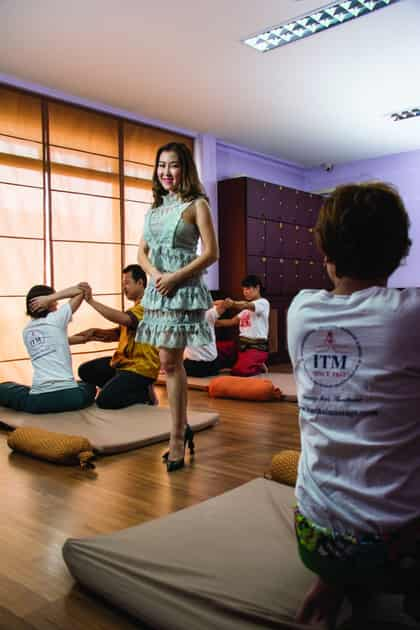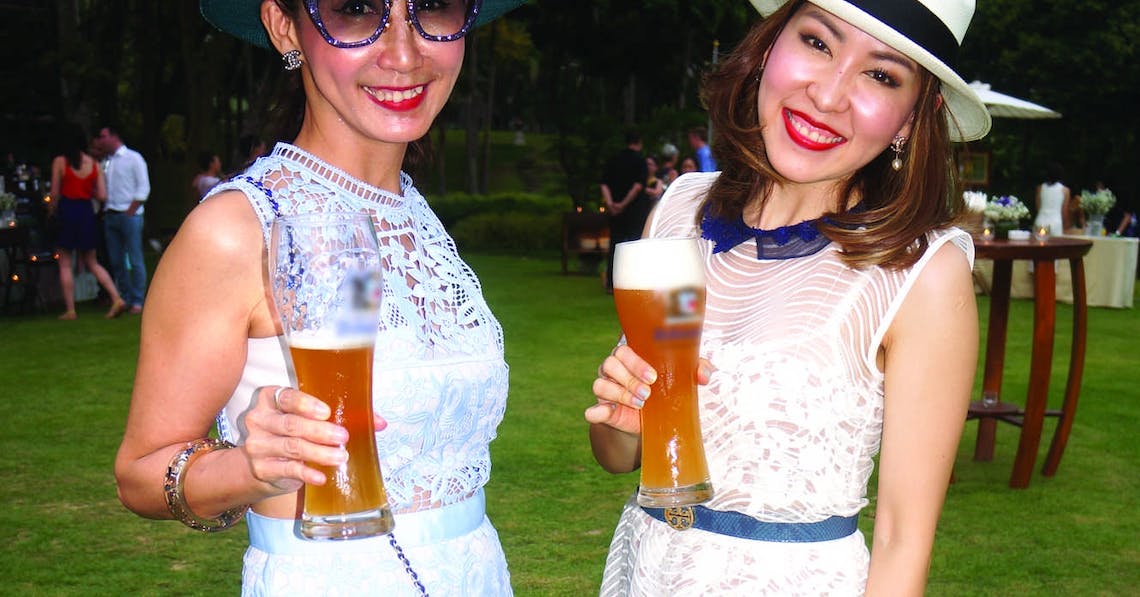It’s always fascinating to see how businesses evolve with the ebb and flow of trends and technology, only the most adaptable, those with the firmest foundations, leaders with the greatest visions, thrive.
Leading up to our magazine’s 25th anniversary next month, and with a touch of nostalgia, we were skimming issues past, when we came across an advertisement for one of our earliest clients, International Training Massage School (ITM), and realised that this traditional business is alive, well, and as far as we know, booming.
In the 80s and 90s, ITM was one of the most popular activities for backpackers in Chiang Mai; it was consistently on the top of Lonely Planet’s (remember when it was THE travellers’ bible) recommendations for activities and every night there would be at least a group or two of fishermen pants-clad tourists unwinding over a Sangthip, discussing latest massage techniques at The Riverside or Daret’s Guesthouse.
Today, ITM is no longer filled with just hoards of backpackers learning massage on their path to spiritual enlightenment – or in some cases, as a tool for seduction – it has grown into an international consultation and training business with affiliations all over the world.
ITM is run by sisters Kate and Liz, familiar faces in the social scene of Chiang Mai. Attractive, well dressed, and always seen, this sisterly duo have taken the helm of the business from their semi-retired parents and have grown it dramatically in the past decade.
“My dad was a lawyer in Bangkok, but he wanted a change,” said Chulaluck ‘Kate’ Setthakorn, the younger of the two sisters, both of whom were groomed from youth to one day take over the family business. “Dad’s relatives owned the Old Medicine Hospital, and invited him to come along and help out because he had English skills and they were beginning to get some interest from backpackers, about 30 years ago.”
Kate’s father, Chongkol ‘John’ Setthakorn, entered the role with gusto and the first thing he did was to create an English language syllabus for the school. He also designed a booklet, with smooth position transitions and choreography for massage, which had been lacking until then. One of the pioneers in creating and teaching the modern curriculum of Northern style Thai Massage, he incorporated movements and body postures from Tai Ji Qi Gong and Tai Chi Chuan into the rhythm of Thai massage, so often copied since that it is now considered the standard for teaching massage in Chiang Mai.
“My sister joined the business in 2004, after many years studying in the US and I returned from Switzerland in 2006, from where I received my MBA. Unlike my sister, who lived in Bangkok, I was mostly brought up in Chiang Mai, having been to Regina Coeli School before graduating from CMU. Even before we returned full time though, we would spend our holidays teaching massage, training masseuses, and helping with various functions of the business.”
By the time the sisters took over, ITM had already begun to change. Before, clients would take a massage course at ITM as part of their Thailand holiday, but by the early 2000s, ITM had become a destination unto itself, as more people saw value in the practice of Thai massage.
“We immediately realised that we needed to be accredited to be recognised and to grow in the international community,” Kate explained of her first priorities upon taking over with her sister. “Our courses ranged from a week to three months, and more and more we were seeing yoga practitioners, doctors, nurses, physiotherapists and other professionals coming to train. Liz’s first challenge was to have us legitimised by the Ministry of Education in 2004 which allowed us to offer diplomas and certificates which can be stamped by the Ministry of Foreign Affairs for equivalency courses abroad, this was very rare in Thailand at the time, and drove more business our way. Liz then also set up Spa Mantra, a day spa where our students can go to have professional massage experiences. Liz’s expertise is in design, décor and creativity while mine is in negotiation and management, it all goes very well together, and this way we can offer our students more services, expanding our business at the same time.”
“When I started, I began to look at the needs of our students and realised that we needed international accreditation. I spent the first few years studying requirements – each country is very different – and making sure that we were up to standard. In Canada, for instance, to become a licensed massage therapist, you need thousands of hours under your belt. You also need to renew your license every few years in order to have your insurance, something very important in the west. It took us a few years, but we eventually could offer equivalency accreditation for the United States, United Kingdom (we no longer have this, but are working to reinstate it), The Netherlands, Canada, Australia and Turkey. So many documents!”
“We then developed 390 hours, 11 week teacher training programmes, and were astounded to see an influx of Thai people come from abroad to take this course so that they can open their own businesses elsewhere. We currently have 2,000 students per year, around 50-120 per day studying these courses.”
Once the sisters had their accreditations in place, they set their eyes on shinier prizes. “We wanted to gain awards and recognition, so we applied to, and received, many of them, finally receiving HM the King’s Royal Award for Best Vocational School in 2008, and again in 2011. If we get a third one, then we gain this title for life, and a golden shield, so fingers crossed this year!”

“Another thing we worked on quite hard was in expanding our affiliations,” Kate continued. “Dad had had informal affiliations with many schools around the world, but we wanted something that was less freestyle. We don’t do franchises, but we allow affiliate schools to use our name if they want (there are eight around the world that do so) and also our syllabus. They can either send their staff to train here with us, or we can send our staff to train them there. Not only that, we provide consultation for the setting up of spas and regular standard checks when required.”
While father and mother still contribute, either in training, or advice, the day to day business is run by the sisters.
“Yes, we socialise and go out a lot, but we are at work every morning. Pi Liz is at her spa and I am here at ITM. With technology, we don’t have to be here all day, we have CCTV we can watch and we can work on mobile, but I like to be in touch with my staff and students.”
Today ITM has dozens of affiliates worldwide and the sisters travel often to train, set up spas, give talks and consult. Every year they visit The Netherlands to train therapists and their clients include the Hyatt as well as Taj Hotel groups, amongst many others.
“Our staff also get to travel,” Kate says proudly. “One of our staff, Jirapa, 53, is from Supanburi, and a very poor farming background. She started off with us fifteen years ago, speaking a very strong accented Thai and no English. Today she is in the most demand and has taught in Singapore, trained Taiwan’s Nursing College students and even been invited as a guest lecturer at a massage festival in Novosibirsk, Russia!”
“It has been interesting for us to change and grow over the years,” said Kate. “From a very traditional and old business, teaching massage to local therapists, through the backpacker trend years, to now being a legitimate and accredited trainer of other professionals worldwide. It’s very satisfying.”
“Where to next? I think the Middle East. They don’t want to learn how to massage there, but they like to be massaged. We trained a lady in Bahrain who had a small spa with five staff. Now, four years later, she has five spas and 50 staff, with two more opening up. We have trained all of them and they also use our curriculum. I see a lot of potential in the Middle East.”
“Liz and I are neighbours, though there is a hole between our fences for easy access,” she laughs. “We argue daily, but I can’t live without her. It works. But I need to get away sometimes though. I love hiking in Switzerland, and when I can, I take a few days off on my own to just think my thoughts. And yes, we both love to shop,” she giggles, as an online shopping site dings an alert on her laptop.
There is little time for actual shopping though, hence the virtual option, as documents are being finalised for submission for HM the King’s Award later this year. Fingers crossed.
